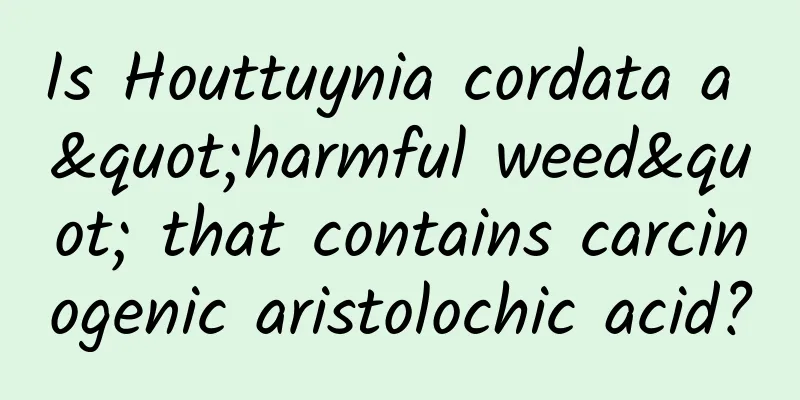Is Houttuynia cordata a "harmful weed" that contains carcinogenic aristolochic acid?

|
Do you know what "pig nose" is? In fact, it is the name of Houttuynia cordata, also known as Houttuynia cordata, in the Sichuan Basin. Many places have a deep love for Houttuynia cordata. For example, there is a famous southwestern dish called fried bacon with Houttuynia cordata. People in Guizhou also make dipping sauce with Houttuynia cordata added, and even Houttuynia cordata flavored yogurt. In addition, cold-mixed Houttuynia cordata is also a classic way to eat it. However, as a vegetable that can be used as both medicine and food, Houttuynia cordata has also been the subject of much controversy. Many people are afraid to eat it, not only because they don’t like its taste, but also because some people think that Houttuynia cordata contains aristolochic acid, which is toxic to the kidneys, and eating too much of it can easily cause cancer, making it a harmful herb. What is the real situation? Let's take a look. Although it smells bad, it is good medicine Houttuynia cordata, people who like it regard it as a treasure; people who don't like it can't stand its smell. The reason why Houttuynia cordata smells different is that it contains houttuynia cordata, which is the volatile component decanoyl acetaldehyde. However, despite its unpleasant smell, Houttuynia cordata extract has a significant therapeutic effect on the treatment of pneumonia and tracheitis in clinical practice. Pan Huijun, chief Chinese medicine pharmacist of the pharmacy department of the Dermatology Hospital Affiliated to Tongji University, said that Houttuynia cordata can be divided into fresh and dried products. Fresh Houttuynia cordata is usually served cold or fried. It not only has high nutritional value, but also can clear away heat and detoxify, eliminate carbuncles and discharge pus, and promote diuresis and relieve stranguria. Dried Houttuynia cordata no longer has a strong fishy smell, but has a fragrance. It can be used to make tea or used as a traditional Chinese medicine in clinical practice to treat diseases such as phlegm-heat, cough, carbuncle, sore and sore. However, Dr. Yun Wuxin, a doctor of food engineering, reminds us that although Houttuynia cordata contains houttuynia cordata, which can fight bacteria and reduce inflammation, it is not clear how much it should be taken to be effective and how effective it is. People who like to eat Houttuynia cordata can eat it occasionally, but if you want to cure diseases by eating Houttuynia cordata, you don't have to do that, as the risks may be greater than the benefits. Aristolochic acid causes cancer, but it has little to do with Houttuynia cordata So what is the relationship between Houttuynia cordata and aristolochic acid? Let’s first learn about aristolochic acid. As early as 2001, the FDA warned consumers not to take plant products containing aristolochic acid, when most people were still unaware of the dangers of aristolochic acid. A few years later, in 2008, the World Health Organization listed aristolochic acid as a Class 1 carcinogen. In other words, there is solid evidence that aristolochic acid causes cancer in humans. As research deepens, more and more studies have found the relationship between aristolochic acid and liver cancer. Simply put, the special gene mutation caused by aristolochic acid appears in the early stages of cell carcinogenesis and is closely related to liver cancer. A study by Shanghai Jiaotong University further confirmed the causal relationship between aristolochic acid and liver cancer. The more aristolochic acid you consume, the more likely you are to get liver cancer. Houttuynia cordata also contains aristolochic acid, so is Houttuynia cordata also carcinogenic? Wait a minute, the aristolochic acid contained in Houttuynia cordata is aristolochic acid BII, AII and FII, while studies have confirmed that aristolochic acid I is highly carcinogenic. They are not the same thing. What's more, there is currently no evidence that the aristolochic acid contained in Houttuynia cordata is toxic or carcinogenic. Now you can eat it with confidence. However, there is one thing to note: some people are allergic to houttuynia cordata, which can manifest as nausea, vomiting and other adverse reactions after smelling or eating it. Such people should not eat it anymore. These 3 drugs have been banned, they are nephrotoxic and carcinogenic At present, there are hundreds of plants containing aristolochic acid, the most common ones include Aristolochia, Aristolochia odorifera, Aristolochia chuanxiong, Aristolochia strychnifolia, Stephania tetrandra, and Scutellaria baicalensis. In 2003, China's State Food and Drug Administration successively cancelled the use of three medicinal herbs containing aristolochic acid: Aristolochia ternata, Aristolochia stephaniae, and Aristolochia lappa, and banned their use completely in 2005. This shows that Chinese medicine is not as safe as we think. In recent years, safety incidents such as Chinese medicine poisoning, liver damage, and kidney damage have occurred frequently. The 2020 edition of the Chinese Pharmacopoeia classifies 83 potentially toxic Chinese herbal medicines, 10 of which are highly toxic drugs. Common clinical causes of Chinese medicine poisoning include excessive dosage, accidental ingestion of counterfeit products, improper preparation, improper dosage, improper compatibility, inappropriate medication, self-medication, and contraindicated groups of people. In fact, from the incident of Houttuynia cordata, we can also see that the public attaches great importance to the safety of Chinese medicinal materials. After aristolochic acid was identified as a carcinogen, some people felt that they should stay away from Chinese herbal medicine. However, this approach of attacking the entire field of traditional Chinese medicine because of problems with one type of Chinese herbal medicine is definitely biased and undesirable. Fortunately, there are more and more studies on the negative side of Chinese herbal medicine. Whether it is the paper on aristolochic acid from Shanghai Jiaotong University or the advent of artemisinin, they are all good examples. We look forward to more such scientific research to discover the efficacy behind traditional Chinese medicine. Therefore, no carcinogenicity has been found in Houttuynia cordata, so there is no need to avoid it, but you should not eat too much. Just eat it moderately. When you are sick, you should take the right medicine for the right condition, and it is best to use it under the guidance of a doctor. In daily life, some people think they have some knowledge of traditional Chinese medicine, so they take medicine randomly, and many of them have problems. You must be rigorous and scientific when taking medicine to treat diseases, so that you can get better faster. |
<<: What do astronauts do when they go out for a walk?
>>: Pay attention! Should you drink a cup of coffee in the morning or in the afternoon?
Recommend
Community operation: How to achieve traffic fission within the community?
The author was one of the initial product manager...
How to realize space classroom? Post-90s astronauts build a "highway" for communication between the earth and the sky
First published: January 12, Xinhua Daily Telegra...
Is Android a closed-off degenerate or a self-redemption? Talking about the huge changes in Android 10
Since the birth of Android, one of its major adva...
Let’s talk about Douyin e-commerce distribution!
Tik Tok is now one of the most frequently used ap...
This action you often do may allow your neck to support the weight of four more heads?
If you are reading this article, please think bac...
How to use advertising materials correctly and optimize Facebook ads
Today I will show you this issue of Facebook'...
The "king of cholesterol" turns out to be this! If you don't want your blood lipids to rise, eat less of these 3 foods
Cholesterol is essential for the normal functioni...
The battle for platform KOL has entered a hand-to-hand fight! How to create “big V influence”?
What do you think? The KOLs on a platform are mor...
A master of political schemes or a ruthless person? Archaeology will help you understand Cao Cao, who is not mentioned in history textbooks
On the eve of May Day, the Cao Cao Gaoling Site M...
Moon exploration, Mars exploration, planetary exploration... What to look out for in my country's future deep space exploration
Xinhua News Agency, Hefei, April 24 , Title: Moon...
Baidu vocational education and training industry advertising promotion case
This article shares with you Baidu’s advertising ...
How to place orders and bid on Juliang Qianchuan
Before the launch of Juleliang Qianchuan, the Dou...
The new Kia K5 has a younger look: the name "Diaosi Sanbao" is not in vain
It is said that the three treasures of losers are...
What were the Five Hegemons of the Spring and Autumn Period and the Seven Heroes of the Warring States Period fighting for?
This is an era rich in idioms and allusions (Some...
What is the difference between a programmer and an engineer?
[[152894]] When I first started working, the inte...









